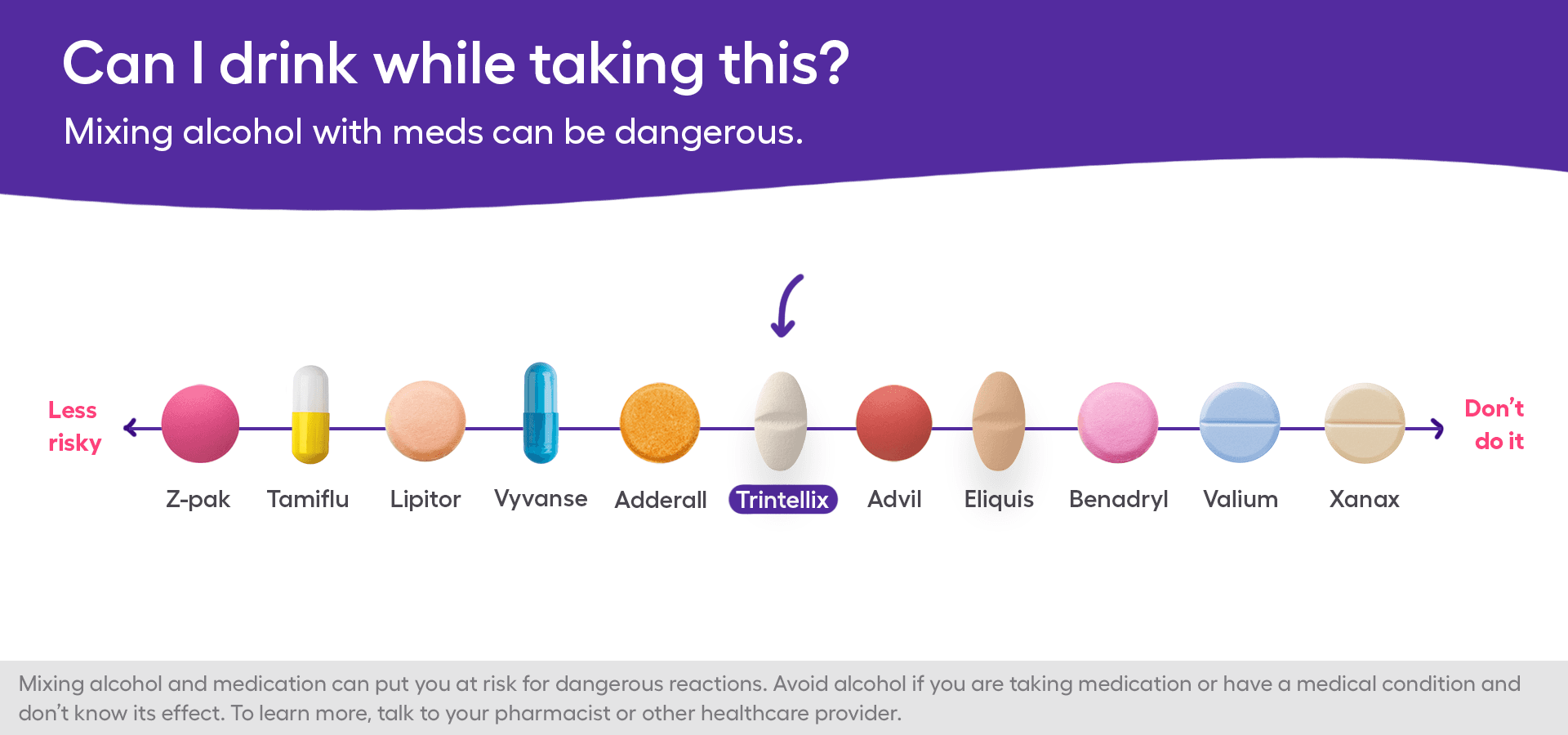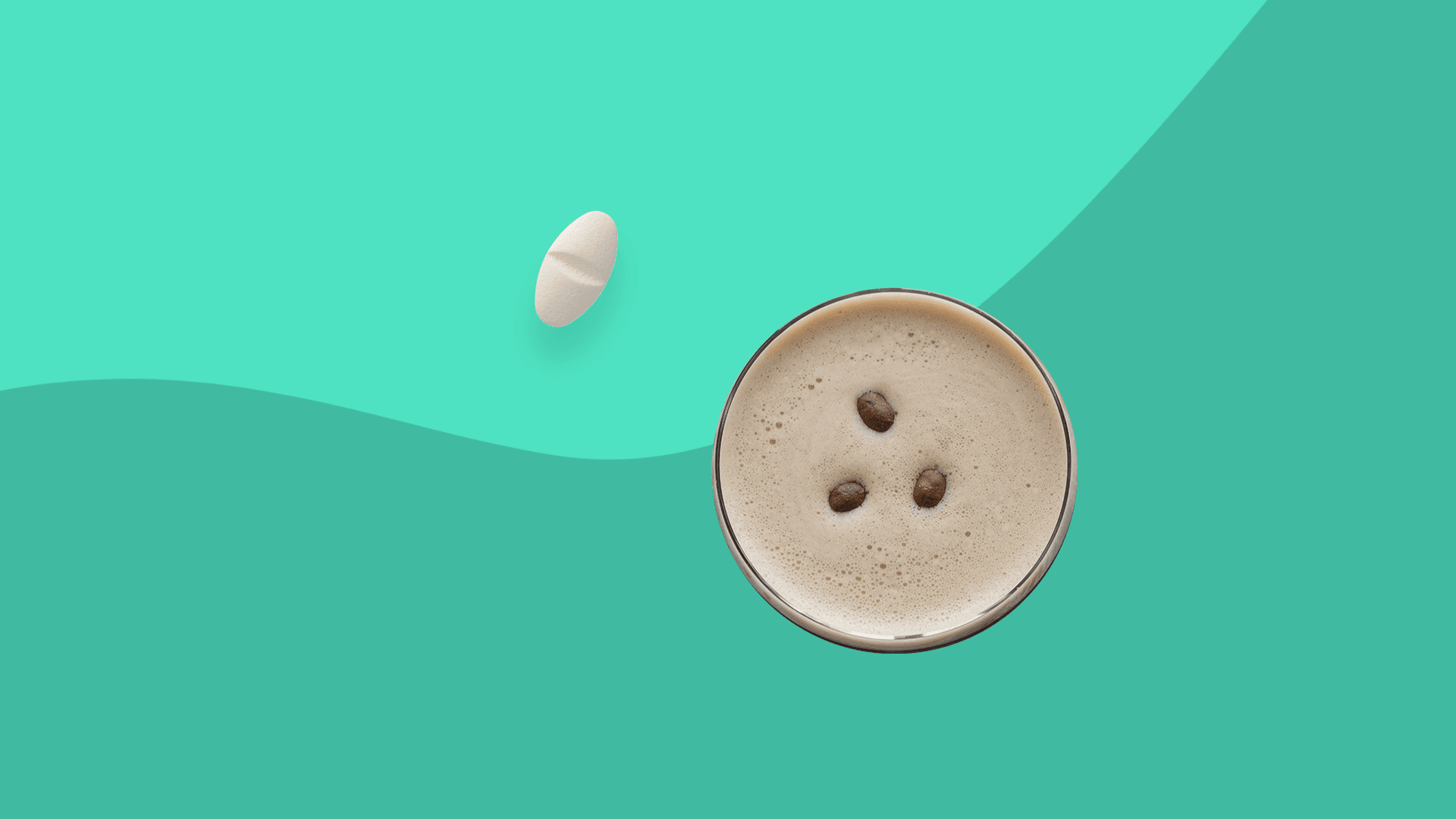Key takeaways
Mixing Trintellix (vortioxetine), an SSRI used to treat major depressive disorder, with alcohol is not recommended due to potential increased side effects such as dizziness and vomiting.
Trintellix’s prescribing information does not list alcohol as a contraindication, but it’s advised to be cautious as drinking can exacerbate the medication’s side effects and potentially worsen depression symptoms.
Alcohol, a central nervous system depressant, can undermine the effectiveness of antidepressants like Trintellix by worsening depression symptoms and reducing serotonin levels.
Chronic alcohol use while on antidepressants, including Trintellix, may lead to severe side effects such as suicidal thoughts, severe anxiety, and impaired motor skills, making it important to discuss alcohol use with a healthcare provider.
Improving your symptoms of depression has been important to you and you’ve recently started on Trintellix to see if it makes you feel better. Now, you have an invitation from a friend to come over for a glass of wine that evening to catch up.
You’re wondering, is it safe to mix Trintellix and alcohol?
What is Trintellix?
Trintellix (vortioxetine) is in a class of medications known as selective serotonin reuptake inhibitors (SSRIs). Unlike some other SSRIs such as Prozac, Trintellix hasn’t been on the market long. It received its FDA approval for use in the United States in 2013. It’s a type of antidepressant used to treat major depressive disorder (MDD).
MDD is also known as depression and can include symptoms such as:
- Feelings of hopelessness
- Loss of interest in previously enjoyable activities
- Reduced energy
- Trouble sleeping
- Difficulty concentrating
If you have MDD, these symptoms affect you almost daily for at least two weeks at a time.
It’s not clear exactly how Trintellix works in the body, but it’s thought to increase serotonin, an important neurotransmitter in the brain. Low levels of serotonin may be linked to symptoms of depression. 
Is it safe to mix alcohol with Trintellix?
The short answer is no, it’s not recommended to drink alcohol while you’re taking Trintellix. But it’s not black and white when it comes to avoiding alcohol completely while on Trintellix.
Trintellix’s prescribing information doesn’t list alcohol as a contraindication or warning. Also, the effects of Trintellix on the liver appear to be minimal, says John Mendelson, MD, the chief medical officer at Ria Health. There’s a chance you could experience abnormal liver enzyme levels, but elevations of these enzymes are rare. Over time, as you continue to take Trintellix, those levels would go back down to normal. Also, with the available data, there haven’t been instances of sudden liver damage or jaundice.
So while Trintellix rarely causes extensive damage to the liver, there are reasons you should be cautious when taking this medication with alcohol.
Drinking that glass of wine can increase the side effects you might experience while taking Trintellix. These side effects can include feeling dizzy, feeling sleepy, and having trouble focusing. If you experience these side effects, you may feel them even more if you drink alcohol.
“No amount of alcohol is safe,” explains Seema Bonney, MD, the founder and medical director of the Anti-Aging & Longevity Center of Philadelphia. “Alcohol and Trintellix shouldn’t be consumed together as [the combination] may cause dizziness and vomiting.”
Can you drink alcohol while taking other antidepressants?
The Food and Drug Administration (FDA) states Trintellix doesn’t “increase the impairment of mental and motor skills caused by alcohol.” This doesn’t mean there’s no risk, though.
Alcohol itself is a central nervous system depressant. It can cause you to become drowsy, feel uncoordinated, and have slurred speech. The problem is, antidepressants can cause the same effects.
According to Dr. Bonney, since alcohol is a depressant it could actually worsen your symptoms of depression over time. Chronic alcohol use has been linked to lower serotonin levels. Since the goal of taking Trintellix is to increase your serotonin levels, the alcohol you drink can undo all the work your antidepressant is trying to do.
According to the National Institute on Alcohol Abuse and Alcoholism, alcohol shouldn’t be used with medications to treat depression. Some of these medications include:
- Abilify (aripiprazole)
- Cymbalta (duloxetine)
- Effexor (venlafaxine)
- Invega (paliperidone)
- Lexapro (escitalopram)
- Paxil (paroxetine)
- Prozac (fluoxetine)
- Zoloft (sertraline)
Monoamine oxidase inhibitors (MAOIs), a type of medication used to treat depression, can cause dangerously high blood pressure when mixed with alcohol. MAOIs can prevent the breakdown of tyramine, a substance found in certain foods and alcoholic drinks that can cause high blood pressure in large amounts.
Wellbutrin (bupropion) can lower your tolerance for alcohol. This means it can take less alcohol than you would usually drink in order to feel its effects.
RELATED: Zoloft and alcohol
Does alcohol make depression worse?
Drinking alcohol can make your depression symptoms worse. For some people, alcohol is used to self-treat depression. Alcohol can make you feel relaxed and less anxious in the short term, but it can also cause you to feel more depressed in the long term.
“One big concern with drinking alcohol is that it actually undermines the primary medical purpose of taking an antidepressant,” explains Dr. Bonney. “It makes you more likely to have worsening depression or anxiety.”
According to Dr. Bonney, drinking alcohol while on antidepressants can also cause:
- Suicidal thoughts and ideas
- Dizziness and nausea
- Severe anxiety
- Headaches
- Impaired coordination
- Digestive problems
- Slurred speech
- Impaired judgment and motor skills
Everyone has their own unique situation and comfort level with drinking alcohol. If you have questions about taking Trintellix for depression, its side effects, or whether you can combine Trintellix and alcohol, talk with your healthcare provider for personalized advice.




